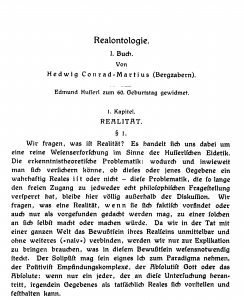 I am a research associate at the Center for the History of Women Philosophers and Scientists, and Post-doc at Paderborn University. Previously, I was a Pre-doc assistant in philosophy at the University of Klagenfurt, Austria.
I am a research associate at the Center for the History of Women Philosophers and Scientists, and Post-doc at Paderborn University. Previously, I was a Pre-doc assistant in philosophy at the University of Klagenfurt, Austria.
At the Center, I am responsible for the project of “Women in Phenomenology”, which is centered around the early phenomenologists Hedwig Conrad-Martius, Edith Stein and Gerda Walther. These women made significant contributions to phenomenology, metaphysics and social theory, as well as being some of the first female academics in Germany.
My research project concerns realism in phenomenology, specifically as it was developed by Hedwig Conrad-Martius in her works of “Zur Erscheinungslehre und Ontologie der realen Außenwelt” (1916) and “Realontologie” (1923). In these works, Conrad-Martius offers a new approach to central problems of metaphysics and ontology, concerning, among other things, the nature of substances, the difference between real and ideal being as well as the phenomenal character of reality.
 The thesis I develop in relation to these texts is that there is a certain way that real being appears as real being, and that this can be understood as the basis for ontological investigations. The phenomenological question at the heart of these investigations is how the reality or mind-independence of different kinds of ontological entities can be grasped in phenomenal terms. To this end, one finds in Conrad-Martius an outline of the realontological predicates of real beings which categorially specifies what real being is, such that it appears in the way that it does.
The thesis I develop in relation to these texts is that there is a certain way that real being appears as real being, and that this can be understood as the basis for ontological investigations. The phenomenological question at the heart of these investigations is how the reality or mind-independence of different kinds of ontological entities can be grasped in phenomenal terms. To this end, one finds in Conrad-Martius an outline of the realontological predicates of real beings which categorially specifies what real being is, such that it appears in the way that it does.
The bold and innovative idea is, therefore, that talk about reality relies on a reciprocal relation between the mind and mind-independent being which is irreducible to standard notions of idealism and realism.
In related research I am working on other women phenomenologists. In a recent paper entitled “Gertrud Kuznitzky and Edith Stein on (non) conceptual experience”, I consider a largely overlooked phenomenological account of nonconceptual experience that turns on experience having a sense that is unique to intuition, and which can be invoked to explain how we come to view what we experience in objective terms without referring to ready-made concepts. The two early phenomenologists Edith Stein and Gertrud Kuznitzky are discussed as having elaborated two distinct, yet related, versions of this intuitive sense.
In “Max Scheler and Hedwig Conrad Martius on the Experience of Reality”, I identify the role that phenomenality plays in conceiving of the experience of reality in Scheler and Conrad-Martius. While Scheler views resistance as preceding the sensual encounter with the world, for Conrad-Martius, the phenomenon of reality is primarily constituted as the direct contact with a sensible object. One thus finds a non-intentional phenomenological approach to the experience of reality in early phenomenology that has, as of yet, not been discussed as a common concern.
Finally, in “Sharing a Realistic Future. Gerda Walther on Sociality”, I look at Gerda Walther’s approach to sociality, which is unique in that it equally employs psychological and phenomenological concepts to conceive of collective experiences, thereby addressing manifold forms of togetherness.
You cannot copy content of this page








